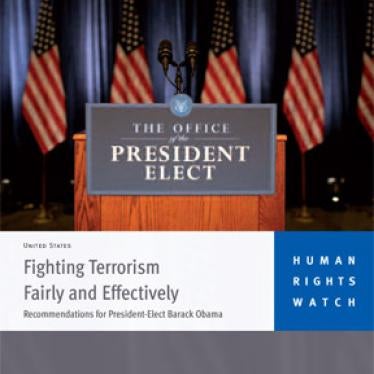December 2, 2008
The Honorable George W. Bush
President of the United States
The White House
1600 Pennsylvania Avenue, NW
Washington, DC 20500
VIA FACSIMILE AND FIRST-CLASS MAIL
Dear President Bush:
The undersigned organizations are deeply concerned that prior to leaving office, you may issue a presidential pardon designed to protect anyone involved in the mistreatment, arbitrary detention, and other serious human rights violations of detainees in the fight against terror. While the Constitution provides the president power "to grant reprieves and pardons" for federal crimes, doing so under the current circumstances would be an unprecedented misuse of the pardon power.
To date, investigations into the unlawful treatment of detainees in connection with the fight against terror have been fragmentary and limited. The actions of the higher echelons of the civilian and military chain of command have not been credibly examined. At the same time, legislation and court decisions have sought to limit the criminal and civil liability of those responsible for egregious human rights violations. It is crucial that the new administration be able to meet the obligations of the United States under international law to investigate allegations of serious human rights violations. This opportunity should not be foreclosed by the unjustified use of the pardon power.
Broad "preemptive pardons" or amnesties have had their place in American history. Yet, a broad pardon to protect those involved in detainee abuse would differ fundamentally from previous group pardons. When Abraham Lincoln and Andrew Johnson pardoned soldiers and officials of the Confederacy, they did so for the unity and reconstruction of the nation after the Civil War. Jimmy Carter's pardon of Vietnam War draft resisters was an attempt to unify the nation after that divisive conflict. Neither of these broad preemptive pardons was for members of a president's own administration.
A preemptive pardon would impede the Justice Department from investigating serious criminal wrongdoing, and deprive the general public of an important investigatory tool for uncovering what was done in its name. A broad preemptive pardon would not only cover low-level military and intelligence personnel who relied on superior orders or legal advice, it could also provide blanket immunity to senior administration and military officials directly responsible for drafting, organizing and implementing the US government interrogation program. Such a pardon would make you the first president to pardon yourself, something Richard Nixon considered but rejected. It would be viewed around the world as an admission of guilt for crimes committed.
Pardons for serious abuses related to the "global war on terror" would also violate the United States' obligations under international law. Treaties ratified by the United States, including the 1949 Geneva Conventions and the Convention against Torture and Other Cruel, Inhuman or Degrading Treatment or Punishment, require that all states investigate and, if appropriate, prosecute those responsible for serious international crimes such as torture. A pardon would constitute an express approval of impunity for potential wrongdoing in the treatment of detainees. It would put the United States at odds with global trends towards greater accountability, interfere with necessary efforts of the new administration to reclaim the United States' position as an international advocate for human rights, and increase the likelihood that individuals who are pardoned would face legal proceedings abroad. This would cause frictions in US foreign relations at the very time when the United States needs to mend such relations. A presidential pardon would also send an extremely negative message to the many torture survivors who now live in the United States, while encouraging those who perpetrate torture elsewhere.
The undersigned organizations strongly believe now is the time to account for past abuses, and, in so doing, reverse the harm done to the respect for human rights and the United State's reputation abroad by its use of torture and other mistreatment of detainees.
We urge you to refrain from issuing a preemptive pardon to those responsible for unlawful interrogation and detention practices.
Sincerely,
American Civil Liberties Union
Amnesty International
Center for Victims of Torture
Evangelicals for Human Rights
Human Rights First
Human Rights Watch
International Center for Transitional Justice
Open Society Policy Center
Physicians for Human Rights
Cc:
Hon. Michael Mukasey, Attorney General
Hon. Mark Filip, Deputy Attorney General
Hon. Ronald Rodgers, Pardon Attorney







